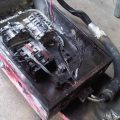Under Pennsylvania’s worker’s compensation law one requirement for an employee or the employee’s family to be eligible for worker’s compensation benefits, is that the injury must have been sustained on the employer’s premises. So, how did the widow of a college professor qualify for worker’s compensation death benefits after the college professor was injured at an off-campus salad bar? According to a Pennsylvania worker’s compensation lawyer, the reason for the professor’s visit to the salad bar determined eligibility for worker’s compensation benefits.
Professor Rabin and the Salad Bar
Professor Jack Rabin was a professor at Penn State Harrisburg, and the chair of his department’s dissertation committee. On October 20, 2006, Prof. Rabin had a lunch meeting at a restaurant with Theodore Aaron Wachhaus, Jr., one of his doctoral candidates, to discuss the student’s dissertation. Prof. Rabin had a habit of meeting with Wachhaus as well as other students at off-campus restaurants to discuss their dissertations. That day the plan was to remain at the restaurant for several hours as they continued to review the dissertation and discuss the student’s upcoming dissertation defense. During the course of the meeting Wachhaus and Prof. Rabin decided to go to the salad bar. The professor fell. He fractured his arm and dislocated his shoulder. Complications from the injury eventually lead to the professor’s death.

Worker’s Compensation Claim
Prof. Rabin’s wife, Sandra, filed a worker’s compensation claim and was awarded benefits. Penn State appealed the award. Penn State first argued that Prof. Rabin did not sustain the injury in the course of employment. The court acknowledged that Prof. Rabin was not on Penn State’s premises when injured, and that the statute requires that the injury occur on the employer’s premises. The court, however, looked to caselaw interpreting the statute and examined whether or not Prof. Rabin was actually “engaged in the furtherance of” Penn State’s affairs at the time. Testimony from the doctoral student supported Mrs. Rabin’s position that Prof. Rabin was indeed working when he fell at the salad bar.
Penn State next noted that Prof. Rabin had pre-existing conditions, including lymphedema, diabetes, hypertension, difficulty breathing, cardiac problems, and cellulitus. Penn State argued that given Prof. Rabin’s medical problems, Mrs. Rabin had not proven that the fall at the salad bar substantially contributed to his death. Looking again to precedent the court noted that where there were competing causes for the injury or death, all the claimant had to show was that the work injury was a substantial factor. Testimony from Prof. Rabin’s physician supported Mrs. Rabin’s contention that the fall exacerbated Prof. Rabin’s pre-existing medical problems and was a material, contributing factor to Prof. Rabin’s death.
Thus, the court upheld the decision of the Worker’s Compensation Appeal Board in favor of Mrs. Rabin.
Does this decision mean that any time an injury occurs off premises while a teacher has lunch with a student, an employer with an employee, or a businessperson with a client, that the injury would be covered by worker’s compensation?
Andrew Mounier is a passionate member of the End Ecocide movement, an avid legal blogger, author and Content Engineer.

















No Comments
Leave a comment Cancel